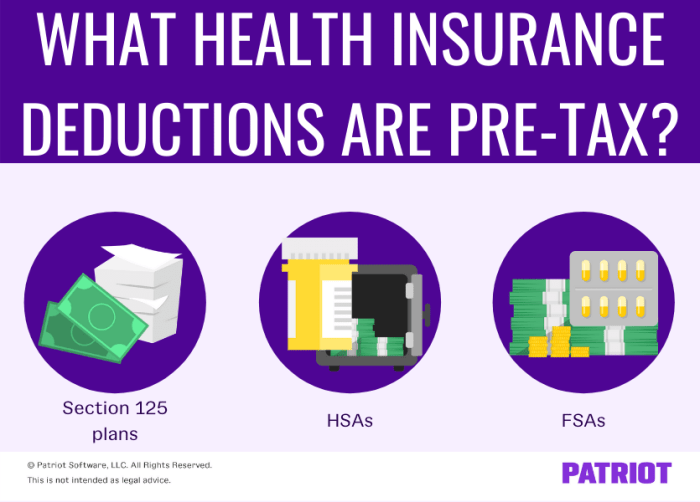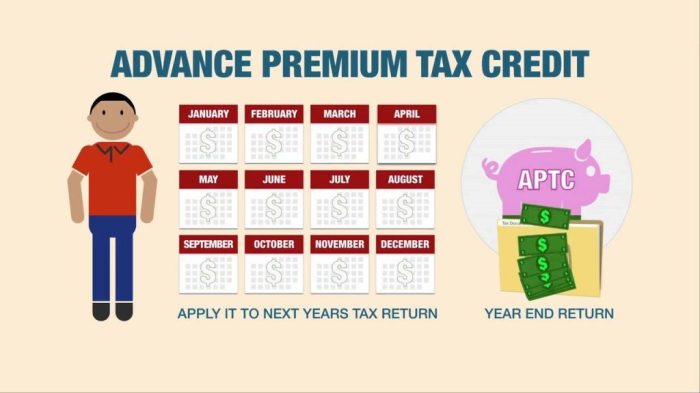Navigating the complexities of health insurance can feel like deciphering a foreign language. One crucial aspect often shrouded in confusion is whether your health insurance premiums are deducted pre-tax or after-tax. This impacts your take-home pay and overall tax burden significantly. Understanding the implications of pre-tax deductions is key to optimizing your financial health and maximizing your savings.
This guide provides a clear and concise explanation of pre-tax health insurance premium deductions, covering eligibility, tax advantages, and comparisons with other tax-advantaged health benefits. We’ll explore how this deduction works, its impact on your overall healthcare costs, and the necessary steps for enrollment and reporting. By the end, you’ll have a solid understanding of how to leverage this valuable benefit.
Eligibility and Requirements for Pre-Tax Health Insurance Premium Deductions

Understanding the eligibility criteria for pre-tax health insurance premium deductions is crucial for both employees and employers. This involves navigating various rules and regulations to ensure compliance and maximize tax advantages. This section will clarify the requirements, the employer’s role, potential limitations, and situations where these deductions might not apply.
Employer-Sponsored Health Insurance Plans
Eligibility for pre-tax deductions for health insurance premiums is primarily tied to participation in an employer-sponsored health insurance plan. The employer must offer a qualified health plan that meets certain IRS requirements. This means the plan must be designed to provide comprehensive medical coverage and be available to a significant portion of the workforce. The employee must then actively enroll in the plan offered by their employer to be eligible for pre-tax deductions.
The Employer’s Role in Facilitating Pre-Tax Deductions
Employers play a vital role in facilitating pre-tax deductions. They are responsible for establishing the payroll deduction system, ensuring accurate reporting to the IRS, and complying with all relevant tax laws and regulations. This involves setting up the necessary paperwork, providing employees with information about the plan, and accurately deducting the premiums from employee paychecks before taxes are calculated. Employers often use specialized payroll software to manage this process efficiently and accurately. Failure to comply with these regulations can result in penalties for the employer.
Limitations and Restrictions on Pre-Tax Premium Deductions
Several limitations and restrictions apply to pre-tax premium deductions. One key limitation is the contribution limit. The amount an employee can deduct pre-tax is capped. This limit is not a fixed number and can vary depending on the plan, the year, and the specific provisions of the employer’s plan. For instance, in certain situations, high-income earners might face restrictions on the amount they can deduct pre-tax. Furthermore, specific types of health insurance plans, or additional benefits added to the plan, might not qualify for pre-tax treatment.
Situations Where Pre-Tax Deductions Might Not Be Applicable
Pre-tax deductions for health insurance premiums may not be applicable in several scenarios. For example, if an employee chooses to forgo employer-sponsored health insurance and instead opts for individual coverage, those premiums are generally not eligible for pre-tax treatment. Similarly, if an employer does not offer a qualified health plan, pre-tax deductions are not possible. Employees who are self-employed or working for companies that do not offer health insurance benefits will not be able to utilize pre-tax deductions for health insurance premiums. Additionally, if an employee’s contributions exceed the annual limit set by the IRS, the excess amount will be taxed.
Flowchart Illustrating the Process of Determining Eligibility for Pre-Tax Deductions
The following flowchart illustrates the process of determining eligibility:
[Start] –> [Employer Offers Qualified Health Plan?] –> [Yes] –> [Employee Enrolled in Plan?] –> [Yes] –> [Contribution Within Limits?] –> [Yes] –> [Eligible for Pre-Tax Deduction] –> [End]
|
No
V
[Not Eligible] –> [End]
|
No
V
[Not Eligible] –> [End]
Comparison with Other Tax-Advantaged Health Benefits

Choosing the right way to pay for healthcare expenses often involves navigating a landscape of tax-advantaged options. While pre-tax deductions for health insurance premiums offer a valuable benefit, it’s crucial to understand how it compares to other popular choices like Health Savings Accounts (HSAs) and Flexible Spending Accounts (FSAs). This comparison will highlight the strengths and weaknesses of each, assisting in making an informed decision.
Pre-tax premium deductions, HSAs, and FSAs all aim to reduce your taxable income, ultimately lowering your tax burden. However, they differ significantly in their eligibility criteria, contribution limits, and how the funds can be used. Understanding these differences is key to selecting the best option for your individual circumstances.
Health Savings Accounts (HSAs) Compared to Pre-Tax Premiums
HSAs are linked to high-deductible health plans (HDHPs). Contributions made to an HSA are tax-deductible, grow tax-free, and withdrawals for qualified medical expenses are also tax-free. This offers a significant advantage over pre-tax premium deductions, as the funds in an HSA can be used for a broader range of medical expenses beyond insurance premiums, including deductibles, copayments, and even some over-the-counter medications. However, eligibility is restricted to those enrolled in an HDHP, and contribution limits are set annually by the IRS. Pre-tax premium deductions, on the other hand, are available to most employees regardless of their health insurance plan, although the amount deducted is limited to the actual premium cost. While HSAs offer more flexibility and potential for long-term savings, pre-tax deductions provide immediate tax relief on your monthly premium.
Flexible Spending Accounts (FSAs) Compared to Pre-Tax Premiums
FSAs are employer-sponsored accounts that allow employees to set aside pre-tax dollars to pay for eligible healthcare expenses. Similar to pre-tax premium deductions, contributions reduce your taxable income. However, unlike HSAs, FSA funds are typically not rolled over to the next year; any unused funds at the end of the plan year are forfeited. FSAs also have annual contribution limits set by the employer. Pre-tax premium deductions don’t have this “use-it-or-lose-it” feature; the deduction is directly applied to your premium cost regardless of whether you use all the covered services. While FSAs offer a convenient way to pay for a variety of healthcare expenses, the annual contribution limits and the forfeiture of unused funds represent a significant disadvantage compared to the consistent tax savings offered by pre-tax premium deductions.
Comparison Table: Tax-Advantaged Health Benefits
| Feature | Pre-Tax Premium Deductions | Health Savings Accounts (HSAs) | Flexible Spending Accounts (FSAs) |
|---|---|---|---|
| Eligibility | Most employees with health insurance | Individuals enrolled in a high-deductible health plan (HDHP) | Employees of participating employers |
| Contribution Limits | Limited to premium cost | Annual limits set by IRS | Annual limits set by employer |
| Usage Restrictions | Only for health insurance premiums | Qualified medical expenses | Qualified medical expenses |
| Rollover | N/A | Yes | Generally No |
| Tax Advantages | Reduces taxable income | Tax-deductible contributions, tax-free growth, tax-free withdrawals for qualified expenses | Reduces taxable income |
Last Point

Ultimately, understanding whether your health insurance premiums are deducted pre-tax is a vital step in effective financial planning. By taking advantage of pre-tax deductions when eligible, you can significantly reduce your taxable income and increase your disposable income. This guide has equipped you with the knowledge to navigate this often-confusing area of personal finance. Remember to consult with your employer and tax professional for personalized advice tailored to your specific circumstances.
Query Resolution
What if my employer doesn’t offer pre-tax deductions for health insurance?
If your employer doesn’t offer pre-tax deductions, you’ll pay your premiums after tax, meaning the full premium amount will be deducted from your post-tax income.
Can I change my pre-tax deduction election during the year?
Typically, changes to pre-tax deduction elections are only allowed during open enrollment periods, although some exceptions might exist depending on your employer’s policies and life events (like marriage or birth of a child).
What happens if I overcontribute to my pre-tax health insurance?
Overcontributions to pre-tax health insurance can result in tax penalties. It’s crucial to accurately track your contributions and ensure they align with IRS guidelines.
Are there any income limits for pre-tax health insurance deductions?
There aren’t income limits for pre-tax health insurance deductions themselves, but eligibility for other related tax-advantaged accounts like HSAs might have income restrictions.